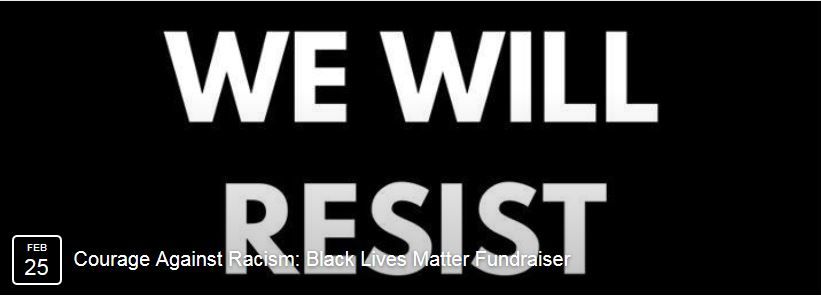
On February 25th, a panel discussion, “The First 30 Days of Trump,” will take place in Los Angeles as part of a Courage Against Racism program. I had a hard time saying yes to the invitation to be a panelist, concerned that my voice won’t be strong enough to adequately match the people of color who will be there to talk about resistance actions. Thankfully, the organizers helped me find the courage to step out of my comfort zone. What follows is some of what I hope to convey.
The primary question I’ve been asked to address is how white people can respond to what lies ahead and how whiteness will play a role.
The first thing we need to do is to stretch. Whatever we’ve been doing to support social and racial justice, we need to keep doing it. And, our current situation calls for more. We each have to step up our game. We need to find our growing edge, that thing we can do that makes us feel uncomfortable, and then lean into it. Of all the efforts we could make, what is one, or two, or even three, additional things we can do that pushes us into new territory? If we have a strong voice, let’s use it in public spaces instead of only in private conversations. If writing is our style, write more, maybe to senators instead of Facebook. If words don’t come, but we have time to show up, then use our bodies to demonstrate our support…at marches, in meetings, even wearing a t-shirt with a message we want to convey. Whichever idea seems a bit out of our comfort zone, but altogether possible, go with that.
The second thing is to build our stamina through community. We have to find ways to keep ourselves involved with justice efforts on a regular basis, resisting the idea that we’ve done our part by simply showing up at a single event. The communities that keep me engaged are AWARE-LA and WP4BL. The monthly meetings keep me energized and focused, they push my thinking, and they keep me in touch with other actions to join. And I know I’m not the only one. So many times those of us who show up start off by saying how hard it was to drag ourselves to whatever meeting we’re at, tired from the day, overwhelmed by our work lives, whatever. But by the end, most of us are talking about how we feel better and ready to get back out there and do more. It’s also helpful in getting us to take action that extends our growing edge. Knowing that my community would be there is what got me to start attending marches and actions. Now I invite others to join me. That’s a big change, an important one, and it wouldn’t have happened without this support system.
The third thing is to avoid letting perfection destroy the good. One of the most pernicious elements of white supremacist culture is how it values perfection. This leads us time and time again into paralyzing self-critique. It can come from our own internal voices or community members who constantly offer harsh, critical analysis in the wake of any effort. Yes, we must hear the critique. And we must also celebrate moments when we successfully turn out people to an effort or have a partial victory. In other words, we need to strike a balance between ensuring that, on one hand, we’re accountable to learning and growing, and on the other, that we appreciate our efforts and each other.
The fourth thing that white people need to do is to insist on expanding our reach. We cannot afford to fall into the trap of the “us vs. them” narrative. While it can feel good to think of ourselves as superior to those who “just don’t get it,” self-righteousness has a lot to do with our current situation. As a white person committed to anti-bias education, I have to be honest that my growing edge for the last couple of years has been around gender and gender identity, and I’m glad that I’ve been learning so much. And, I’ve ignored socio-economic class. I recall hearing a lecture a few years ago at the White Privilege Conference. The speaker talked a lot about how our language around privilege wasn’t going to cut through to working class white folks. He offered approaches that would be more effective, and I wrote them down. And, then I got busy and let it go.
Over the years AWARE-LA has had some conversations about socio-economic class, how our meetings draw mostly middle-class people, and how we needed to be more responsive to working class white folks so that we could more effectively engage them in conversations on race. But, we haven’t really made a serious effort. Multiply this by the thousands of anti-bias trainings that occur throughout the country, and it’s easy to see that there really is an important point to be made here. As white folks, we need to work on our understanding, our language, and our outreach, and our understanding so we can cross socioeconomic class barriers. This is our job, and we can’t allow legitimate calls for us to stay attentive to our race privilege to stop us from addressing the fact that our intersectionality lens has been limited. We may have thought that a progressive agenda would take care of it, but some serious misunderstandings have undercut those efforts. See What People Don’t Get about the U.S. Working Class for some important insights.
As a fifth and final point, we white people have to ritualize our action. We have to do something, anything, the next thing, the scary thing, and it needs to become a ritual. Why do we need it to become a ritual? As a recent flyer I received said, “Outrage is an emotion, so is unsustainable. Ritual is both sustainable and sustaining. Ritual builds discipline, motivation, dedication, and will.” So, what can we do on a daily, weekly, or monthly basis that keeps us engaged, using our voice, and in community? How can we ritualize our resistance?
To conclude, I’ll offer six ideas and invite you to think of more.
1. On a daily basis, write a note on a postcard and send it to a state or local official. Use the website 5 calls to help you get organized: https://5calls.org/
2. On a daily or weekly basis, call a state or local official and let them know you either support what they’re doing or want them to support something specific. Right now there is a great, active spreadsheet that offers Senator’s positions, contact info, and public statements on the travel ban.
3. Support groups led by people of color in your local community. Join their meetings, and if invited, respond to their calls for action.
4. Join AWARE-LA or WP4BL meetings on a monthly basis. If you’re not in LA, seek out a Showing Up for Racial Justice (SURJ) chapter or another group working to resist Trump’s policies – See Indivisible to find or start local groups
5. Sign up to receive “Injustice Boycott” emails from Shaun King. He’s offering daily and/or weekly very doable calls to action that have already had significant impact on discrete issues.
6. Join a national organization positioned to support what we hold dear, like the ACLU, Southern Poverty Law Center, Planned Parenthood, or the Immigrant Defense Fund. Stay abreast of their actions.
And as we do these things, stay focused, stay active, and stay in community. There are a lot of us, and we can do a lot of good together. Thank you.





